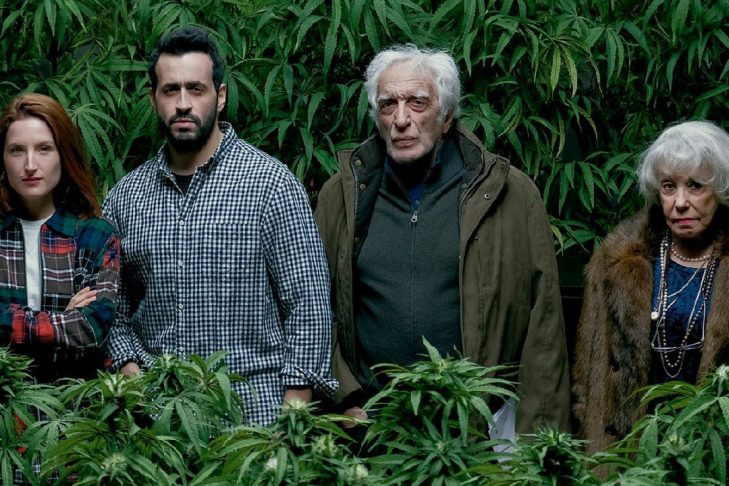A viral tweet described the new Netflix series “Family Business” as a “French ‘Breaking Bad’ but with weed.” That’s not exactly accurate. Having just binged this show about a French Jewish family that owns a kosher butcher shop in the Marais neighborhood of Paris, I found it to be more like a French version of “The Three Stooges” meets “Breaking Bad.” That, of course, implies that “Family Business” is funny slapstick, but it’s not. It’s merely slapstick, and clumsy slapstick at that.
I can’t tell if it’s the poor dubbing that put me off of “Family Business” or the bad acting. I suspect it’s a combination of both. The premise is that the Hazan family’s meat shop, which has been in the family for three generations, is failing. The family patriarch, Gerard, is a Sephardic North African Jew who stubbornly refuses to upgrade the shop or listen to his children, Joseph and Aure, who unhappily work with him. Joseph, played by French comedian Jonathan Cohen, is an entrepreneur who flames out on idea after idea. Early on in the series, he tries to sell an app that mimics a wind tunnel so a user can quickly end an awkward phone call.
Related
Joseph is constantly paying for his father’s bad decisions—financially and personally. But he thinks he’s found a solution to the family’s woes when he and his friend Olivier run into a daft old acquaintance at a local club. The stoned woman tells them she has it on the authority of her father, the health minister, that cannabis is about to be legalized in France. A light bulb—dim as it may be—goes off in Joseph’s head. He can reinvent the family butcher shop as a marijuana den. Think of Amsterdam, where Gerard and Joseph end up bonding over the quality of the weed they’re smoking and ingesting. At one point, Gerard asks if the edibles are kosher.
It sounds like this should be a fun, whacky summer comedy. It isn’t. I didn’t expect the show to be hyper-realistic, but I thought it would have some plausibility. The fact that the Hazans are on the verge of bankruptcy is never explained. Did they suddenly lose a large percentage of their clientele within the space of a year? And if they did, doesn’t that give the series’ writers an opportunity to insert a bit of smart commentary on France’s rising anti-Semitism? Over the past five years, some 30,000 Jews have left the country for Israel. There is one oblique reference to the community’s security situation, when Aure’s hastily abandoned suitcase in front of the butcher shop is blown to bits.
The only actor who has a chance of salvaging any of this series is the feisty grandmother, Ludmila. Well played by Liliane Rovère, a Holocaust survivor, Ludmila has chutzpah and business smarts. If anyone can save this obtuse family, it’s her. Quintessentially Jewish, she peppers her sentences with Yiddish words, affectionately calling her grandchildren “Bubbelah.” Ludmila supports the grieving Gerard and offers her granddaughter, Aure, a closeted lesbian, advice and comfort. She tells Joseph that love is love and it doesn’t matter if he marries Aida, the little sister of his closest friend, Ali. Ali is a Muslim and a working-class guy. The circumstances under which Joseph and Ali come to be friends are never addressed.
Through a set of strained coincidences, Joseph and Gerard end up driving the butcher shop’s truck, emblazoned with the Hazans’ name and a Star of David, to Amsterdam. The two, who get unbearably high on this outing, have an encounter with a violent pimp. In the meantime, their family and friends worry they’ve been harmed.
Aure, Ludmila and Olivier finally locate father and son as Ludmila breaks away from the group to kick-start the family’s new business. She purchases $3 million worth of marijuana clippings with her life savings. In another unbelievable coincidence, the Dutch seller happens to be an old lover of hers. Ludmila also comes up with the idea of stuffing a dead pig with the weed she’s purchased. When this hapless group is pulled over for a traffic stop, they are forced to open the back of the truck. They claim the dangling pig is there so they can experiment with making pork kosher. Oy.
There are more challenges along the way. The group has also crossed into the turf of a violent, unbalanced and unexpectedly silly drug dealer played to hilarious perfection by Dutch actress Tamar Cohen. At their country estate, the Hazans take over the barn to cultivate their weed, but it turns out the local police are using its nearby shooting range for the season. To save their illegal stash, Ludmila cooks kishke, as well as mullukhi, a Sephardic soup, to mask the smell. This is the series’ nod, however brief, to peaceful interrelations that can occur between Sephardic and Ashkenazi Jews.
While each of the show’s half-hour segments ends on a cliffhanger, I had no interest in what happened next. The only thing that leaves me wondering about “Family Business” is why it has been renewed for a second season on Netflix.





